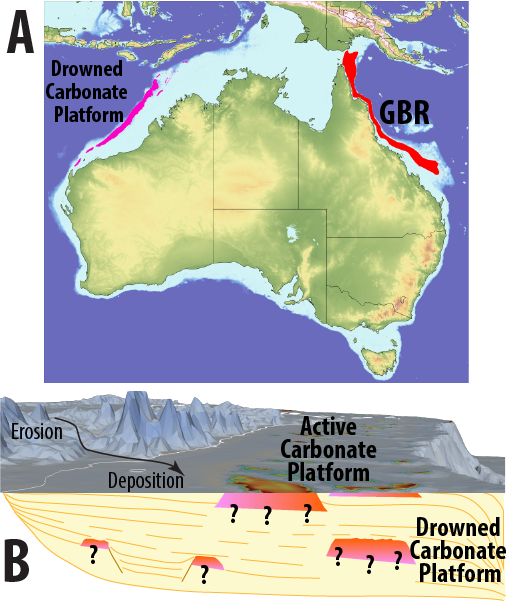THE RISE AND DEMISE OF EARTH’S GIANT REEF SYSTEMS
Expression of Interest

This PhD scholarship is only available to Australian domestic applicants. Submit your expression of interest for this PhD scholarship opportunity to Dr Sabin Zahirovic via email (sabin.zahirovic@sydney.edu.au) by 30 June 2021 (with the subject line “DECRA-PHD-2021”). In your expression of interest, include a CV, academic transcript, and a cover letter (1 page long). The successful applicant will be required to start the PhD project in late 2021. (This advert was posted online on 1 June 2021.)
Summary
Major reef systems, on the scale of the Great Barrier Reef on Australia’s continental margin, build enormous geological structures called carbonate platforms. However, the geological record of continental margins demonstrates that these enormous reef systems can proliferate for millions of years, and can then be extinguished and covered by sediments flushed from the continental margin. For example, a massive reef system on Australia’s northwest shelf was active from 15 million years ago, and was suddenly drowned 10 million years ago. It remains unclear how this occurred, considering that long-term global sea levels were falling during this time, rather than rising. This project aims to study continental margins and evaluate what processes (tectonics, mantle convection, climate, sediment runoff, etc.) may be triggering the shut-down of these immense ecosystems. The project will require the student to collate published data on carbonate platforms, continental margin sediments, and other geological data, and incorporate it into numerical models that consider mantle convection, tectonics, sea level, and landscape evolution. The outcomes of this project has fundamental implications for constraining global sea level in the geological past, as well as improving our understanding of the planetary “deep” carbon cycle. An opportunity to attend conferences will be available, pending the COVID travel situation, and this data-interpretation and model-driven project is a low-risk pathway considering the ongoing COVID disruptions to field work and travel. In addition, the successful applicant will be provided with an office space, a high-performance laptop computer and peripherals, and access to a 3D printer for the purposes of the PhD project. A top-up scholarship ($8,000 per year, for 3 years) and an opportunity for paid Research Assistant work are also available.
Supervisor(s)
Dr Sabin Zahirovic, Dr Tristan Salles
Research Location
Program Type
PHD
Synopsis
Major reef systems, on the scale of the Great Barrier Reef on Australia’s continental margin, build enormous geological structures called carbonate platforms. However, the geological record of continental margins demonstrates that these enormous reef systems can proliferate for millions of years, and can then be extinguished and covered by sediments flushed from the continental margin. The project will require the student to combine data and numerical modelling to identify the mechanisms responsible for the proliferation and demise of major reef systems on continental margins.
Additional Information
Applicants need to have a background in geology, geophysics, marine science, environmental science or related fields (First or Second Class Honours, OR Masters with a significant research component). Past experience in processing and visualising geospatial data using GIS and other tools (e.g., Generic Mapping Tools), as well as coding in Python will be helpful in completing this project. Previous experience with using plate tectonic reconstruction tools like GPlates, or numerical mantle flow modelling will be considered favourably. Applicants will need excellent written and oral communication skills, a high level of ethics and team-work abilities, and time management skills. This PhD program will support a funded Australian Research Council DECRA project, and will involve national and international collaborations.
HDR Inherent Requirements
In addition to the academic requirements set out in the Science Postgraduate Handbook, you may be required to satisfy a number of inherent requirements to complete this degree. Examples of inherent requirements may include:
- Confidential disclosure and registration of a disability that may hinder your performance in your degree;
- Confidential disclosure of a pre-existing or current medical condition that may hinder your performance in your degree (e.g. heart disease, pace-maker, significant immune suppression, diabetes, vertigo, etc.);
- Ability to perform independently and/or with minimal supervision;
- Ability to undertake observatory, sensory and communication tasks;
- Meet initial and ongoing immunisation requirements (e.g. COVID-19, Q-Fever, Vaccinia virus, Hepatitis, etc.)
You must consult with your nominated supervisor regarding any identified inherent requirements before completing your application.
![]()
